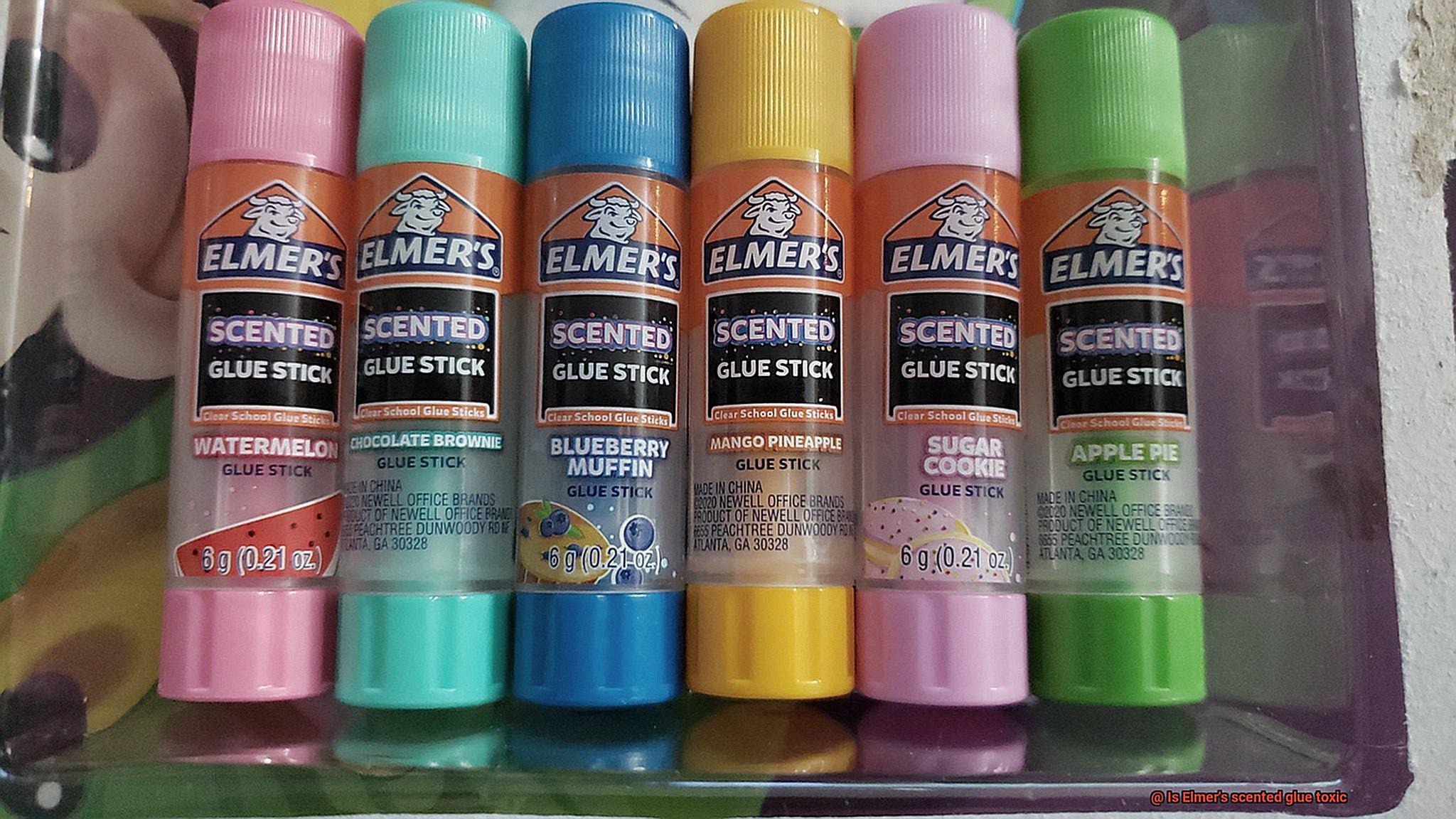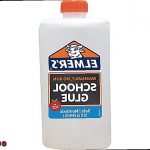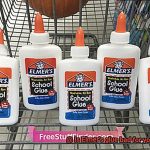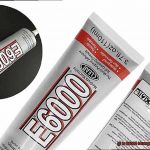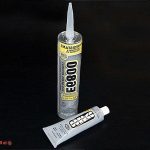We all know how a whiff of something delightful can transport us to another realm, conjuring up fond memories or igniting our creative spark. But what if that scented glue we love using in our masterpieces hides a not-so-pleasant surprise?
Today, we’re diving headfirst into the captivating world of Elmer’s scented glue to uncover the truth behind its fragrant allure. Armed with facts and a keen eye, we’ll explore the ingredients and assess any potential health hazards that might be lurking beneath its aromatic charm. So buckle up, my friends, because we’re about to embark on an enlightening journey together.
Before we begin, I want to emphasize that while I’m well-versed in this subject matter, it’s always wise to consult multiple sources and prioritize your personal safety above all else. With that said, let’s dive right into this quest for knowledge.
Examining the Ingredients of Elmer’s Scented Glue
Contents
- 1 Examining the Ingredients of Elmer’s Scented Glue
- 2 Assessing the Safety of Elmer’s Scented Glue
- 3 Reviewing Product Labels and Safety Data Sheets
- 4 Checking Regulatory Standards for Product Safety
- 5 Considering Intended Use of Elmer’s Scented Glue
- 6 Potential Health Risks from Fragrance Components
- 7 Accidental Ingestion or Prolonged Skin Contact
- 8 Conclusion
Elmer’s, the renowned brand for adhesive products, offers a range of glue options, including scented glue. This article aims to thoroughly examine the ingredients of Elmer’s scented glue to determine its safety and understand its sensory experience.
The Key Ingredient: Polyvinyl Acetate (PVA):
Elmer’s scented glue relies on the power of polyvinyl acetate (PVA), a polymer that forms a sticky substance upon drying. PVA is not only safe but also non-toxic, making it suitable for various applications. Additionally, being water-based, this glue can be easily washed off with soap and water.
Fragrances, Dyes, and Preservatives:
To enhance the sensory experience, Elmer’s scented glue incorporates fragrances, dyes, and preservatives. Rest assured, all the fragrances used in these glues are non-toxic and safe for use. However, individuals with known sensitivities or allergies should exercise caution and conduct a patch test before extensive use.
Safety Precautions:
While Elmer’s scented glue is generally safe for external use, ingestion should be avoided at all costs. In case of accidental ingestion, seeking immediate medical help is recommended.
Assessing the Safety of Elmer’s Scented Glue
This popular adhesive is not only known for its sticky prowess but also its delightful fragrances that make crafting a truly sensory experience. However, safety is always a top priority, especially when it comes to products we use in arts and crafts. In this blog post, we will delve into the safety considerations and guidelines for using Elmer’s scented glue, so you can confidently unleash your creativity without any worries.
Ingredients:
Elmer’s scented glue primarily contains polyvinyl acetate (PVA), a non-toxic compound widely used in adhesives. PVA is considered safe for arts and crafts materials, ensuring that your masterpieces are free from harmful substances.
Fragrance Additives:
To create those irresistible scents, Elmer’s scented glues may contain fragrance oils or other additives. These synthetic fragrance oils vary in composition, so it is crucial to assess their safety as well. Rest assured, Elmer’s scented glue undergoes rigorous testing to ensure compliance with safety standards, including toxicity and potential hazards.
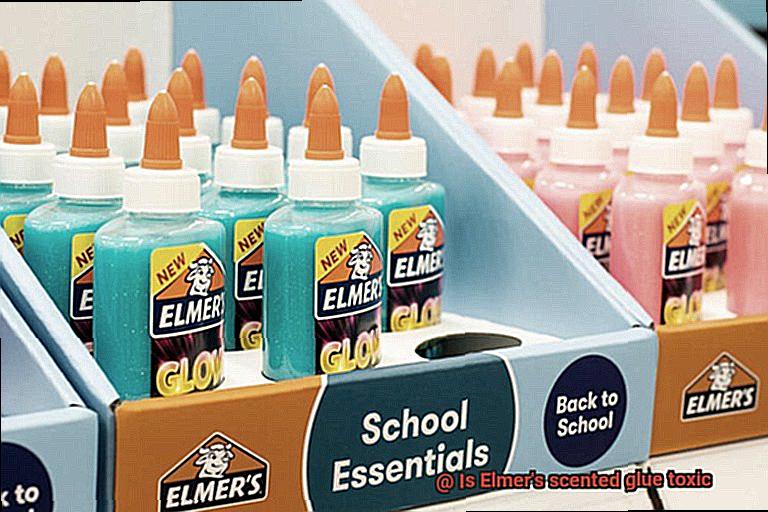
Regulations and Labeling:
The Consumer Product Safety Commission (CPSC) diligently regulates consumer products in the United States, including glues. Manufacturers are required to comply with CPSC regulations, providing accurate labeling and safety information. This means you can trust that Elmer’s scented glue meets necessary safety requirements.
Usage Guidelines:
To ensure your safety when using Elmer’s scented glue, it is vital to follow the manufacturer’s instructions. These guidelines often include recommendations for proper ventilation, avoiding direct eye contact, and keeping the glue out of reach of children. By adhering to these instructions, you can enjoy worry-free crafting sessions.
Individual Sensitivities:
While Elmer’s scented glue is generally safe for use, it’s important to consider individual sensitivities and allergies. Some individuals may have specific sensitivities or allergies to certain fragrance oils or other additives. If you have known sensitivities, it’s advisable to test a small amount of the glue on a small area of skin before using it extensively.
Adverse Reactions:
In the rare event of adverse reactions after using Elmer’s scented glue, such as skin irritation or difficulty breathing, it is crucial to seek immediate medical attention. Reporting any adverse reactions to the manufacturer or relevant authorities can help ensure ongoing product safety.
Reviewing Product Labels and Safety Data Sheets
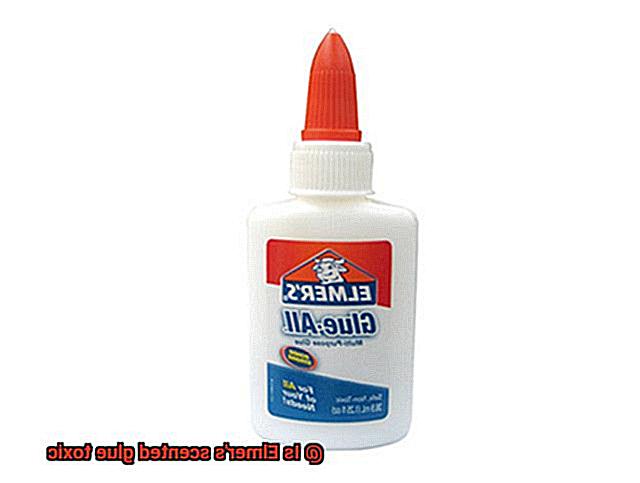
Reviewing product labels and safety data sheets is of utmost importance when it comes to ensuring our safety and well-being. Whether it’s Elmer’s scented glue or any other product, taking the time to understand the information provided on these documents can make a significant difference in preventing potential hazards and protecting ourselves.
Product labels act as our first line of defense against harm. They provide essential warnings and precautions that alert us to any potential risks associated with the product. By carefully reading and understanding these labels, we can identify specific hazards that may be present and take appropriate measures to mitigate them. Additionally, product labels often include a list of ingredients, allowing us to identify any substances that could be of concern to us. This knowledge empowers us to make informed decisions about whether or not to use a particular product.
However, product labels only scratch the surface when it comes to understanding the intricacies of a product’s safety profile. This is where safety data sheets (SDS) come into play. SDS are comprehensive documents that provide in-depth information about a product’s chemical composition, physical properties, and potential health hazards. When reviewing SDS for products like Elmer’s scented glue, we can access specific toxicological data and gain insights into potential health effects. This knowledge enables us to take necessary precautions and make informed choices regarding product usage.
Moreover, SDS offer guidance on proper storage and disposal methods, as well as any personal protective equipment that may be required. By following these instructions, we can reduce the risk of accidents or mishaps associated with the product. In case of any doubts or concerns, consulting healthcare professionals or contacting poison control can provide further guidance on handling potentially toxic substances.
Checking Regulatory Standards for Product Safety
In our daily lives, we often take for granted the safety of the products we use. However, behind the scenes, regulatory standards tirelessly work to protect us from potential harm. This article sheds light on the crucial task of checking regulatory standards for product safety, with a special focus on glue. Let’s dive into the sticky truth and uncover how these standards safeguard our well-being.
Why Do Regulatory Standards Matter?
- Safeguarding Consumers: Regulatory standards serve as a shield, protecting consumers from potentially harmful substances present in products. They ensure that manufacturers adhere to guidelines set by regulatory bodies, such as the esteemed Consumer Product Safety Commission (CPSC) in the United States.
- Comprehensive Safety Checks: These standards encompass various aspects of product safety, including chemical composition, labeling requirements, and potential hazards associated with product use. This rigorous testing and evaluation process guarantees that products like glue undergo thorough scrutiny before reaching store shelves.
Glue and Regulatory Standards:
- Craft Supplies Category: Glue, particularly scented glue like the popular Elmer’s brand, falls under the craft supplies category. Consequently, it must meet specific safety standards outlined by regulatory bodies to safeguard users, particularly children.
- Manufacturer Responsibility: Manufacturers shoulder the responsibility of conducting comprehensive testing and evaluation to ensure compliance with safety standards. Moreover, they must maintain transparency by accurately labeling all ingredients used in their products.
- Inspections and Audits: Regulatory bodies conduct periodic inspections and audits to verify manufacturers’ compliance with safety standards. Non-compliance can result in fines, recalls, or even legal action.
How Can Consumers Ensure Glue Safety?
- Check for Certifications: When purchasing products like Elmer’s scented glue, look for specific certifications or seals of approval from recognized regulatory bodies. These certifications provide assurance of adherence to stringent safety standards.
- Utilize Online Resources: Regulatory agencies offer valuable online resources that enable consumers to access safety alerts or recalls related to glue or similar products. By staying informed, consumers can make educated choices about the products they use.
Considering Intended Use of Elmer’s Scented Glue
Are you a craft enthusiast searching for that perfect adhesive to bring your projects to life? Look no further than Elmer’s scented glue. Whether you’re a student, an artist, or just someone who loves getting their hands messy with DIY creations, understanding the intended use of this scented glue is key to unlocking its full potential.
Elmer’s scented glue is specially formulated to bond lightweight materials such as paper and cardboard. It’s the ideal companion for creating vibrant collages or adding a touch of fragrance to your artistic endeavors. But why is intended use so important, you might wonder?
When used as directed, Elmer’s scented glue poses minimal risks. It is designed to be applied in small amounts, reducing the chances of inhaling any potentially harmful fumes. Moreover, most crafters wisely choose to work in well-ventilated areas, providing an additional layer of safety. However, it’s crucial to exercise caution and consider a few factors.
Firstly, it’s worth noting that some individuals may have allergies or sensitivities to specific ingredients in the glue. This can result in skin irritations or respiratory issues. To ensure safe use, always read the product label and follow the instructions provided by the manufacturer. Remember, even a slight sniffle or itchiness could be your body signaling a need for caution.
Should you experience any adverse reactions while using Elmer’s scented glue, it is best to discontinue use immediately and seek medical advice if necessary. In the grand scheme of things, your health should always take priority over that fabulous glitter project.
Overall, when used as intended, Elmer’s scented glue is generally considered safe. However, let’s not get carried away with our creative dreams just yet. It’s always wise to take proper precautions and be aware of any potential risks. So go ahead, embrace your artistic side, and let the enchanting scents of Elmer’s glue transport you to a world of imaginative bliss.
Potential Health Risks from Fragrance Components
Fragrance components are commonly used in various consumer products to provide a pleasant scent. However, it is crucial to be aware of the potential health risks associated with these fragrance components. This article aims to shed light on the dangers that these components can pose to our health.
Phthalates: Hormone Disruptors:
Phthalates, often found in fragrance components, are known as hormone disruptors. These chemicals have been linked to reproductive and developmental issues, asthma, allergies, and even certain types of cancer. It is essential to choose products that are phthalate-free to minimize exposure and reduce the risk of these adverse health effects.
Allergic Reactions: A Concern for Sensitive Individuals:
Fragrance components can trigger allergic reactions, especially in individuals with sensitive skin or pre-existing allergies. These reactions can manifest as skin irritation, respiratory problems, and headaches. It is vital for sensitive individuals to carefully read product labels and avoid products with fragrance components that may cause discomfort.
Volatile Organic Compounds (VOCs): Invisible Culprits:
Fragrance components may contain volatile organic compounds (VOCs), which contribute to indoor air pollution. Breathing in high levels of VOCs can lead to eye, nose, and throat irritation, as well as headaches and nausea. Prolonged exposure to VOCs has been associated with more severe health issues like liver and kidney damage. To reduce exposure, ensure proper ventilation when using products containing fragrance components.
Accidental Ingestion or Prolonged Skin Contact
Elmer’s scented glue has gained popularity in the world of arts and crafts, captivating both children and adults with its sweet scent. However, it is crucial to be aware of the potential risks that come with accidental ingestion or prolonged skin contact with this seemingly innocent product. In this article, we will explore the various dangers, long-term effects, and safety measures associated with Elmer’s scented glue.
Ingredients: A Closer Look at the Hazards
Elmer’s scented glue contains several ingredients that can pose potential hazards. While polyvinyl alcohol, the primary adhesive ingredient, is generally considered non-toxic, consuming large amounts can cause gastrointestinal irritation. Prolonged skin contact may also lead to skin irritation or allergic reactions in sensitive individuals.
Fragrance: A Deceptive Threat
The synthetic fragrance used in scented glues can contain chemicals that irritate the respiratory system or trigger allergic reactions. Although the concentration of fragrance in Elmer’s scented glue is typically low, it is crucial to avoid inhaling excessive fumes or allowing prolonged skin contact to prevent potential harm.
Preservatives and Colorants: Unseen Culprits
Preservatives like methylparaben and propylparaben are added to prevent bacterial growth in the glue. In small amounts, they are generally safe. However, some individuals may experience skin irritation or allergies as a result of their presence. Similarly, the vibrant colorants used in Elmer’s scented glue may trigger sensitivities or allergies in certain people.
Long-Term Effects: A Warning for Health
It is important to recognize that continuous exposure to potentially harmful substances can have long-term effects on our health. While Elmer’s scented glue is generally safe when used as directed, excessive exposure through accidental ingestion or prolonged skin contact should be avoided to minimize any potential risks.
Prevention and Safety Measures: The Key to Protection
To prevent accidental ingestion or prolonged skin contact, it is crucial to follow the safety instructions provided by the manufacturer. Keep the glue out of reach of children, avoid contact with eyes and mouth, and thoroughly wash hands after use. In case of accidental ingestion or prolonged skin contact, seek medical attention if any symptoms of irritation, allergic reactions, or discomfort arise.
Conclusion
In summary, Elmer’s scented glue is deemed safe for artistic projects. The primary ingredient, polyvinyl acetate (PVA), is non-toxic and widely utilized in adhesives. Rigorous testing ensures that the fragrances, dyes, and preservatives used in the scented glue are also non-toxic and meet safety standards.
However, caution must be exercised when handling Elmer’s scented glue. While it poses no harm externally, ingestion should be strictly avoided. In the event of accidental ingestion, immediate medical assistance is strongly advised. Furthermore, individuals with known sensitivities or allergies should conduct a patch test before extensive use.
To ensure safe usage, valuable information about ingredients and potential hazards can be found on product labels and safety data sheets. Familiarizing oneself with these documents is crucial.
Compliance with regulatory standards plays a vital role in product safety. Manufacturers are obligated to adhere to these standards by providing accurate labeling and safety information.
By following manufacturer instructions, checking for certifications from recognized regulatory bodies, and being mindful of potential health risks associated with fragrance components, consumers can confidently indulge their creativity with Elmer’s scented glue.
Always prioritize personal safety above all else and consult healthcare professionals or poison control if any adverse reactions occur.

